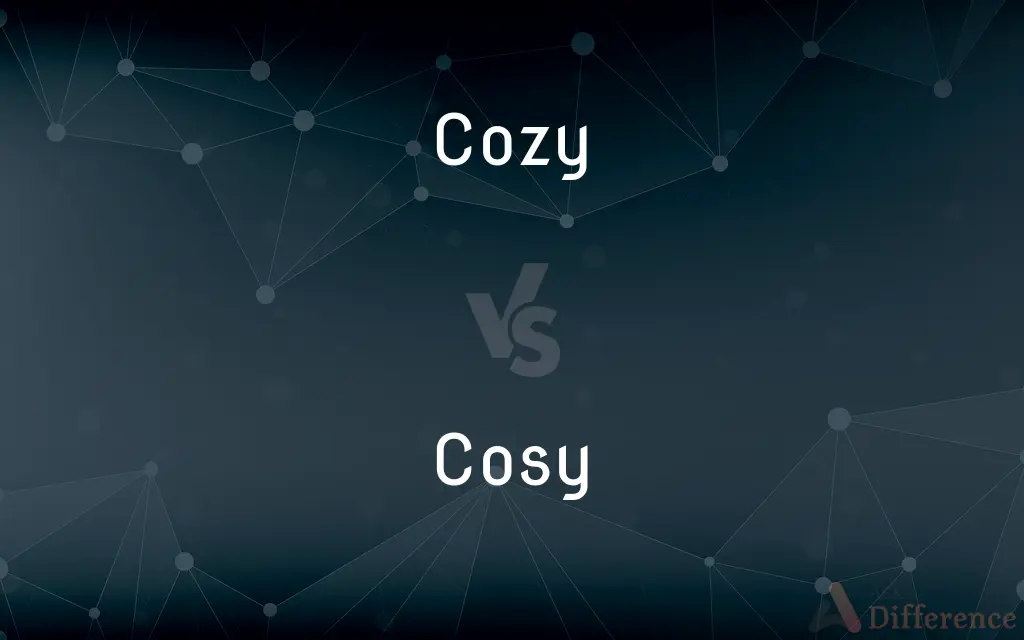Cozy vs. Cosy — What's the Difference?
By Maham Liaqat & Urooj Arif — Updated on March 15, 2024
"Cozy" and "cosy" both describe a feeling of comfort, warmth, and relaxation, differing only in regional spelling preferences: "cozy" in American English and "cosy" in British English.

Difference Between Cozy and Cosy
Table of Contents
ADVERTISEMENT
Key Differences
The term "cozy" is the preferred spelling in American English, used to describe environments, situations, or clothing that provide a sense of warmth, comfort, and relaxation. It often evokes images of snuggling by a fire or wearing warm sweaters. Whereas, "cosy" follows the British English spelling convention, carrying the same meanings and connotations. The choice between "cozy" and "cosy" typically depends on the regional language norms, reflecting the differences in American and British English.
In literature, "cozy" mysteries represent a genre where crime and detective work are presented in a light, humorous manner, usually in a small community setting. On the other hand, "cosy" mysteries would be the term used within the UK and other Commonwealth countries to describe the same genre, emphasizing the cultural spelling differences while retaining the genre’s characteristics.
When it comes to marketing or branding, the spelling of "cozy" or "cosy" might be chosen based on the target audience's location. American companies tend to use "cozy" to evoke feelings of warmth and comfort, while British or Commonwealth-based businesses prefer "cosy" for the same effect, ensuring the message resonates with their audience's linguistic preferences.
The perception of what constitutes a "cozy" or "cosy" atmosphere can vary slightly based on cultural contexts. In the United States, "cozy" might conjure images of plush throws and soft lighting, while in the UK, "cosy" could also imply a snug, small cottage with a roaring fire. Despite these minor cultural nuances, the core idea of comfort and warmth remains consistent.
Both terms, regardless of spelling, are used colloquially to describe feelings of contentment and security, like being in a "cozy/cosy" room on a cold day. This universal appeal underscores the emotional and physical comfort both versions of the word aim to convey, bridging any transatlantic differences.
ADVERTISEMENT
Comparison Chart
Spelling
Cozy
Cosy
Usage
In American English contexts
In British English contexts
Literature Genre
Cozy mysteries
Cosy mysteries
Marketing
Used in the US market
Used in the UK/Commonwealth market
Cultural Connotation
Often associated with homey, warm interiors
Might include snug, small spaces with warmth
Compare with Definitions
Cozy
Pleasant and enjoyable.
They had a cozy time watching movies all night.
Cosy
Compact and snug.
Their cosy cottage in the countryside was a peaceful retreat.
Cozy
Small, comfortable, and warm.
Their cozy apartment was perfect for the winter.
Cosy
Amiable and congenial.
The party had a cosy vibe, with everyone chatting warmly.
Cozy
Informal and friendly.
The café had a cozy atmosphere that made guests feel at home.
Cosy
Safe and snug.
Wrapped in a cosy blanket, she sipped her tea contentedly.
Cozy
Secure and comfortable.
The cozy corner of the library was her favorite reading spot.
Cosy
Satisfying and delightful.
The cosy dinner date was filled with laughter and good conversation.
Cozy
Providing warmth and comfort.
The cozy blanket made the chilly evening much more bearable.
Cosy
Offering a feeling of comfort and warmth.
The cosy living room was inviting after a long day.
Cozy
Snug, comfortable, and warm.
Cosy
Variant of cozy.
Cozy
Marked by friendly intimacy
A cozy chat.
Cosy
Affording comfort and warmth; snug; social
Cozy
(Informal) Marked by close association for devious purposes
A cozy agreement with the competition.
Cosy
Warm and comfortable.
I feel very cosy here in my bed.
Cozy
To make oneself snug and comfortable
Cozy up with the Sunday paper.
Cosy
A padded or knit covering put on an item to keep it warm, especially a teapot or egg.
Cozy
(Informal) To try to get on friendly or intimate terms; ingratiate oneself
"out on the ... hustings, cozying up to reactionaries and racists alike" (Chuck Stone).
Cosy
A padded or knit covering for any item (often an electronic device such as a laptop computer).
Cozy
(Informal) To cause to appear comfortable or conducive to intimacy
Added some pillows to cozy up the room.
Cosy
To become snug and comfortable.
Cozy
A padded or knitted covering placed over an item, especially a teapot, to keep it hot.
Cosy
To become friendly with.
He spent all day cosying up to the new boss, hoping for a plum assignment.
Cozy
A hollow cylindrical holder, usually made of foam rubber or a similar soft material, used to keep a beverage cold while being held.
Cosy
See Cozy.
Cozy
Standard spelling of cosy
Cosy
A padded cloth covering to keep a teapot warm
Cozy
Standard spelling of cosy
Cosy
Enjoying or affording comforting warmth and shelter especially in a small space;
A cozy nook near the fire
Snug in bed
A snug little apartment
Cozy
Standard spelling of cosy
Cozy
Snug; comfortable; easy; contented.
Cozy
Chatty; talkative; sociable; familiar.
Cozy
A wadded covering, often decorative, for a teakettle or other vessel to keep the contents hot. Also called tea cozy
Cozy
A padded cloth covering to keep a teapot warm
Cozy
Enjoying or affording comforting warmth and shelter especially in a small space;
A cozy nook near the fire
Snug in bed
A snug little apartment
Cozy
Having or fostering a warm or friendly atmosphere; especially through smallness and informality;
Had a cozy chat
A relaxed informal manner
An intimate cocktail lounge
The small room was cozy and intimate
Cozy
Suggesting connivance;
A cozy arrangement with the police
Common Curiosities
Which spelling should I use for an international audience?
The choice depends on your target audience or the dominant form of English used in your context. For a broad international audience, either form can be understood.
Are "cozy mysteries" and "cosy mysteries" the same genre?
Yes, they represent the same genre, differing only in the spelling used by American or British/Commonwealth publishers.
Is there a difference in meaning between "cozy" and "cosy"?
No, the difference is purely in spelling, with "cozy" being American English and "cosy" being British English.
Does the spelling change affect how products are marketed?
Yes, products may be marketed using the spelling that resonates more with the target regional audience, whether "cozy" for American consumers or "cosy" for British/Commonwealth consumers.
Can I use "cozy" in British English?
While "cosy" is preferred in British English, using "cozy" is understandable but may stand out as American.
Is it common to see both spellings in the same English-speaking country?
It's more common to see one spelling dominate based on the country's preference for American or British English, but with global communication, both can appear.
Is "cozy" only used for physical warmth?
No, "cozy" can also describe emotional warmth and comfort, not just physical warmth.
Can a book be "cosy"?
Yes, describing a book as "cosy" suggests it gives the reader a comfortable, warm feeling, similar to the concept of "cosy mysteries."
How do interior designers use the concept of "cozy" or "cosy"?
They use it to describe spaces that evoke feelings of warmth, comfort, and relaxation, with thoughtful lighting, soft textiles, and comfortable furniture.
Can "cozy" or "cosy" describe a relationship or feeling?
Yes, it can describe a close, comfortable, and affectionate relationship or the warm, pleasant feeling such a relationship provides.
Do "cozy" and "cosy" have the same pronunciation?
Yes, both spellings are pronounced the same way.
Can a restaurant be described as "cosy"?
Yes, describing a restaurant as "cosy" suggests it has a warm, inviting, and comfortable atmosphere.
Are there any rules for choosing between "cozy" and "cosy"?
The choice generally depends on the version of English you are using or the regional preference of your audience.
Does the context of use affect the choice of spelling?
Not really, as the choice is more about regional spelling preference than context. However, specific industries or genres may consistently use one spelling.
Is there a difference in the type of comfort "cozy" and "cosy" imply?
No, both imply a similar type of physical and emotional comfort, despite the regional spelling differences.
Share Your Discovery

Previous Comparison
Riot vs. Protest
Next Comparison
Yup vs. YepAuthor Spotlight
Written by
Maham LiaqatCo-written by
Urooj ArifUrooj is a skilled content writer at Ask Difference, known for her exceptional ability to simplify complex topics into engaging and informative content. With a passion for research and a flair for clear, concise writing, she consistently delivers articles that resonate with our diverse audience.














































